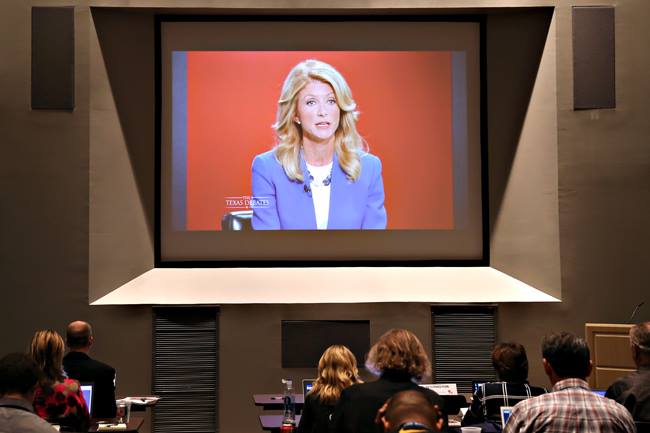If you have yet to see a television advertisement from the Wendy Davis or Greg Abbott campaign, you are in an unlikely minority. According to the Center for Public Integrity, a nonpartisan organization that tracks political TV advertisement spending, $56 million has been spent in Texas statewide elections so far this election cycle. Second to spending in Florida, Texas has seen the highest amount of spending in the nation over the last year.
This is attributable to the large amounts spent so far in the race for governor and two nasty Republican primaries for lieutenant governor and attorney general. Over 45,000 television advertisements have been run in the campaign for governor, totaling $26.3 million. These figures also do not include the money spent on other ubiquitous campaign advertisements such as those pesky yard signs and direct mail.
Political advertising is especially expensive in Texas because of the geography of the state. Texas has 20 media markets, with Dallas-Fort Worth and Houston in the top 10 most expensive media markets in the country. An advertising point (one single ad) in the DFW media market costs roughly $750. While other markets are much less expensive (an Austin point costs roughly $180, and a point in the Rio Grande Valley costs roughly $130), the number of media markets makes running a statewide advertising campaign expensive.
Campaign operatives believe that advertising works. Indeed, recent comments from Davis, a state senator from Fort Worth, also indicate she believes her ad buys have been valuable as well. Speaking to the Texas Tribune following a controversial advertisement her campaigned aired about Abbott, her opponent and the current Texas attorney general, Davis said, “What we know from testing this ad with voters is that it is an incredibly effective ad because it drives home the point, a point that we’ve been making throughout this campaign, that Greg Abbott is in this for himself and for his insider friends.” The Abbot campaign in turn strongly condemned the ad.
Good political advertisements are extensions of the overall message campaigns intend to communicate with voters. Davis’ recent ad reflects her characterization of Abbott as an insider looking out for his own benefit, while Abbott’s most recent ad “Governor Obama” reflects his campaign’s message that has mostly ignored Davis and focused on the policies of President Barack Obama.
While public polling has shown the race tightening in the last few weeks, according to the Real Clear Politics average of major polls, Abbott is generally a 9 to 10 point favorite to win the election. It is important to note, however, that polling universes usually only include likely voters and an increase in voter turnout could close or widen the margin dramatically. Both campaigns hope their television ads make up the difference.
Yet despite the millions of dollars spent on advertising and the amount of media attention directed toward analyzing these ads, scholars of political communication have challenged their perceived efficacy. Steven E. Finkel of the University of Pittsburgh found the party identification and racial composition of an electorate could predict a large majority of the votes in an election. Most other scholars conclude that television ads have a marginal effect on a race, possibly swinging the decision 2 to 3 percentage points. In addition, data remains inconclusive on the effect negative advertising has on voter turnout.
So yes, Texas voters may be tired of seeing political advertisements and the ads may not actually change the course of an election, but it should be clear ads will be here to stay. In addition, as people increasingly move from watching content on TV and gravitate toward online viewing platforms like Hulu, Netflix and YouTube, expect more political advertising in between episodes of “Orange is the New Black.” And without a doubt, we are on track to experience one of the most expensive statewide elections in Texas history.
Soto-Vásquez is a media studies graduate student from El Paso. He is also a member of the Texas Student Media Board of Operating Trustees, which oversees The Daily Texan.





















